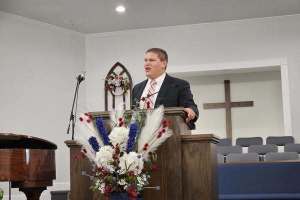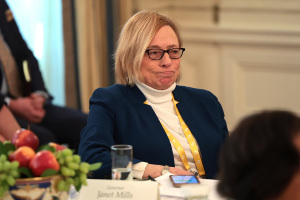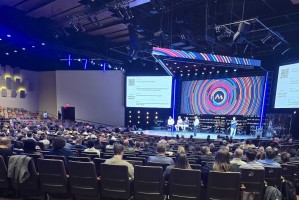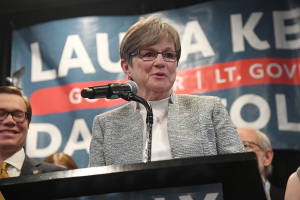Theologian makes biblical case for why white Christians need to support reparations for black Americans
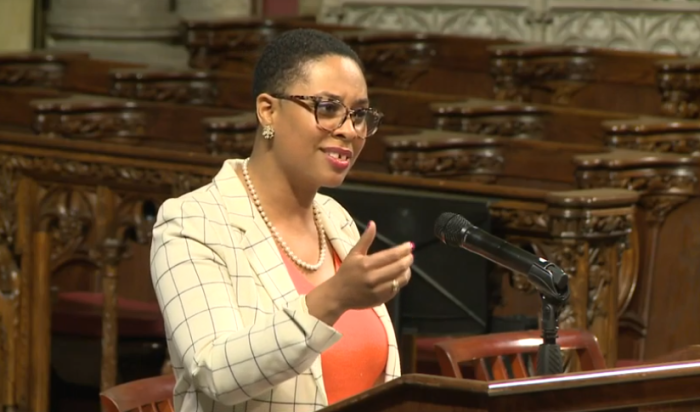
White Christians need to get behind a growing movement pushing for reparations for African Americans because it is a biblical principle endorsed by Jesus, associate professor at Princeton Theological Seminary Keri Day recently contended.
Day, who teaches constructive theology and African-American religion at the Ivy League seminary, made the argument earlier this month in a lecture at the historic Riverside Church in Manhattan. She defended her argument using the story of Zaccheus the tax collector.
“When we turn to the Gospel, we see that Jesus is clear that reparations or restitution to those who have been exploited and rendered vulnerable is not optional but required. Consider Jesus’ encounter with Zaccheus in Luke 19,” Day said.
“Zaccheus is a tax collector who has participated in Roman imperial oppression against marginalized Jewish populations. Jesus sits with Zaccheus but is clear with Zaccheus on what his reparative response needed to be and that this reparative response as Zaccheus was tasked to do was not simply and only a political response but was more deeply a theological response,” she explained.
“In his encounter with Zaccheus, I want to suggest that Jesus sets forth a reparations ethic …. Zaccheus is expected to give back that which he has stolen so that he can be reconciled with others and God. Reconciliation cannot occur until he has given back what he has stolen.”
Day’s argument came on the 50th anniversary of iconic civil rights leader James Forman’s famous interruption at the church where he presented the Black Manifesto, which sent shockwaves across white America in 1969.
Forman and other blacks who had attended the National Black Development Conference that year, demanded $500,000,000 in reparations from white churches and Jewish synagogues for black Americans, arguing that they were complicit in upholding the system of slavery that exploited blacks. The demanded sum would have worked out to approximately $15 each for the approximately 30 million black American population.
“This is a low estimate fro (sic) we maintain there are probably more than 30,000,000 black people in this country. $15 a negger isn’t a large sum of money and we know that the churches and synagogues have a tremendous wealth and its membership, white America, has profited and still exploits black people,” the group argued.
“We are also not unaware that the exploitation of colored peoples around the world is aided and abetted by the white Christian churches and synagogues. This demand for $500,000,000 is not an idle resolution or empty words. Fifteen dollars for every black brother and sister in the United States is only a beginning of the reparations due us as people who have been exploited and degraded, brutalized, killed and persecuted,” the manifesto said.
Hilda Clark, a longtime Riverside Church member who was present during Forman’s interruption, recalled the tension that was created by his protest.
“I saw this young man, protest down the aisle and I wondered ‘what’s up with this.’ He mounted the stage began to speak and people began to get, I guess something between annoyed and perplexed. Riverside at the time was a fairly formal operation and this man was violating protocol for sure. And immediately a few people got up and left but I decided to sit and see what would happen,” Clark said.
“Later on I heard words like reparations. Not something I knew a lot about but I got the message. He then started talking money and masses of people got up and walked out and they were mostly white but there were a few black people who walked out also.”
While Forman’s group did not get the $500 million they demanded, a year later in 1970, The New York Times reported that many mainline churches committed approximately $127 million toward social programs for black Americans in response to church protests which had expanded beyond Riverside Church.
A long time coming
Prior to making her argument for a Bible-based reparations ethic, Day explained that black Americans have been making the case for reparations since the end of the Civil War.
Callie House, a formerly enslaved black woman, argued to Congress after the Civil War that every ex-slave should get a pension in order to be equal citizens. Even Martin Luther King Jr., in his “Economic Bill of Rights for the Disadvantaged,” maintained that public and private sectors, including white churches, needed to provide some sort of economic repayment for the collective years of slavery and racial oppression.
The well-known phrase "Forty Acres and a Mule" also emerged in the South after the Civil War, and it asserted the right of newly freed slaves to redistributed lands — especially plantations confiscated by U.S. troops during the war.
The land was supposed to serve as reparations for unpaid labor during slavery. Historians credit the phrase to General William T. Sherman's Special Field Order Number 15, issued on Jan. 16, 1865, which set aside a 30-mile tract of land along the South Carolina and Georgia coasts for former slaves. It also promised the army's help securing loaned mules. The Freedmen's Bureau was also initially authorized to divide abandoned and confiscated lands into 40-acre tracts for rental and eventual sale to refugees and former slaves. The efforts of Radical Republicans to redistribute the land during the Reconstruction period, however, were eventually abandoned and whites reclaimed their land in the south and blacks were forced into sharecropping, which kept them poor and powerless.
The experience with "Forty Acres and a Mule" was later used to advocate for affirmative action programs developed from the civil rights movement in the 1960s.
Day also highlighted the “Freedom Budget for All Americans” that was proposed by A. Philip Randolph and a coalition of black, socialist, and progressive leaders, including Martin Luther King Jr., who had come together to organize 1963’s March on Washington. The ambitious policy proposal was created in the fall of 1965, after the Voting Rights Act passed with a goal to end poverty in the United States without cost to taxpayers. It proposed using strong economic growth to provide a federal jobs guarantee, universal health care and a basic income.
“This bill required $10 to $12 billion from the combined efforts of public and private sectors and it was understood that the private sector would include religious communities such as churches,” Day said.
“There are some scholars that say even requiring some sort of financial reparative work is seen in some of the work that King was doing as well. In fact, the number of white pastors, Episcopal, Methodist, some Baptist pastors, agreed in principle with some sort of economic payment for a history of economic disenfranchisement among blacks. These were those marching with King,” she added.
Reparations in 2019
Riverside Church’s commemoration of Forman’s interruption comes as the reparations discussion has emerged as a major talking point among 2020 Democrat presidential candidates.
Many in the crowded field, including Andrew Yang, Beto O’Rourke, Julián Castro and Kamala Harris, have voiced strong support for reparations for the descendants of slaves.
“I have said several times during the last several weeks that I have long believed that our country will never truly heal until we address the original sin of slavery,” Castro, the former secretary of U.S. Housing and Development under former President Barack Obama, said last month. “If under our Constitution we compensate people if we take their property, why wouldn’t we compensate people who were considered property and sanctioned by the state?”
In January, Texas Rep. Sheila Jackson Lee introduced the H.R. 40 bill, called the Commission to Study and Develop Reparations Proposals for African Americans Act, to look more deeply into the discussion.
Reparations and repentance
In her biblical argument for reparations, Day argued that the story of Zaccheus demonstrates, in her opinion, what true repentance looks like.
“I recognize that for some theologians and biblical scholars, it would be a stretch to interpret this interpersonal encounter between Zaccheus on a structural systemic level. Such encounters, so the argument goes, do not always translate perfectly within larger institutional contexts,” she said.
“I want to take that seriously. You have conservative voices that say it’s a personal ethic altogether, but you have some other voices. I would consider myself standing in the tradition of Reinhold Niebuhr, who essentially says there is no perfect justice. And in some ways, some of the ethics that you find in the Bible they do not translate into larger institutional settings where power and interest sort of mark or characterize what the world is,” she continued.
“I do want to say that while imperfect, this encounter that Jesus has with Zaccheus does indeed translate into a larger structural context. I think that Jesus’ own reparations ethics when He tells give back what is stolen and then can be reconciled with others and with God, sheds light on what is central to God’s economy, which includes restitution and real material repair as the grounding of God’s salvific work in history,” Day explained.
“So God’s salvific work is not merely the existential but it is also the material. Such discussions are not separate or unrelated to the reign of God. Instead, Jesus’ own thoughts here to Zaccheus, provide evidence that reparative work is Kingdom work. It is part of what constitutes the unfolding of the Good News.
“And most importantly, what I think is being communicated in this encounter is that Zaccheus’ salvation could only be made complete in his action to repair. … How does this translate into this moment even in thinking about the salvific work or history, what God has done in Jesus Christ that salvation history is always ongoing, redemption is seen as always ongoing, that part of that redemption is not fulfilled and complete until what has been stolen is returned and repaired and restitution has occurred?”
White Christians, Day argued, should see reparations as an act of worship.
“White Christians should see themselves, I would argue, as held underneath the same signs of the times, with the Zaccheus commissioning of sorts, that the reign of God involves repair as one’s spiritual act of worship. What might it mean to wrestle with how Jesus’ ministry empowers white Christian communities to see reparations not only as a theological imperative but as a spiritual act of worship,” she contended.
White Christians supporting reparations for black Americans would also reset the notions and practices of repentance, she argued.
“Repentance in some Christian traditions is too easily seen as verbal in the form of simple apologies. So in this account repentance involves acknowledging wrongdoing in the past, feeling contrition for injury that has been caused, and promising to not do it again in the future. The future in this account is a qualitatively different point on the time continuum that the past. The past and the future are inter-related in this account but located at different points altogether. The call for repentance in this account stresses to leave behind the past by not committing the same infraction again. But this view of time, I would argue, … in thinking about repentance, has no way of tracking how the past stretches into the present, how the past is the future, how the past is a becoming into the present,” Day said.
“In my estimation, we get repentance wrong. And we get repentance wrong because we have a distorted idea of time, of temporality. And I want to note here that I think in some ways I think part of it is just hegemonic interest, so I don’t want to say, where people get repentance wrong is in some ways is this insufficient notion of time.
“I think that there’s real interest. In other words, white interest is very important to why white communities do not take up this very important work. But I also do think that the past is construed in a very particular way in this country. And it deeply shapes how we think about the gospels and how we think about salvation and therefore how we think about repentance.”
















